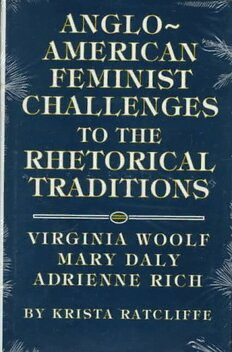Download Anglo-American feminist challenges to the rhetorical traditions: Virginia Woolf, Mary Daly, Adrienne Rich PDF Free - Full Version
Download Anglo-American feminist challenges to the rhetorical traditions: Virginia Woolf, Mary Daly, Adrienne Rich by Krista Ratcliffe in PDF format completely FREE. No registration required, no payment needed. Get instant access to this valuable resource on PDFdrive.to!
About Anglo-American feminist challenges to the rhetorical traditions: Virginia Woolf, Mary Daly, Adrienne Rich
One of the few authors to define and focus on feminist theories of rhetoric, Krista Ratcliffe takes Bathsheba’s dilemma as her controlling metaphor: "I have the feelings of a woman," says Bathsheba Everdene in Hardy’s Far from the Madding Crowd, "but only the language of men." Although women and men have different relationships to language and to each other, traditional theories of rhetoric do not foreground such gender differences, Ratcliffe notes. She argues that feminist theories of rhetoric are needed if we are to recognize, validate, and address Bathsheba’s dilemma. Ratcliffe argues that because feminists generally have not conceptualized their language theories from the perspective of rhetoric and composition studies, rhetoric and composition scholars must construct feminist theories of rhetoric by employing a variety of interwoven strategies: recovering lost or marginalized texts; rereading traditional rhetoric texts; extrapolating rhetorical theories from such nonrhetoric texts as letters, diaries, essays, cookbooks, and other sources; and constructing their own theories of rhetoric. Focusing on the third option, Ratcliffe explores ways in which the rhetorical theories of Virginia Woolf, Mary Daly, and Adrienne Rich may be extrapolated from their Anglo-American feminist texts through examination of the interrelationship between what these authors write and how they write. In other words, she extrapolates feminist theories of rhetoric from interwoven claims and textual strategies. By inviting Woolf, Daly, and Rich into the rhetorical traditions and by modeling the extrapolation strategy/methodology on their writings, Ratcliffe shows how feminist texts about women, language, and culture may be reread from the vantage point of rhetoric to construct feminist theories of rhetoric. She rereads Anglo-American feminist texts both to expose their white privilege and to rescue them from charges of na?vet? and essentialism. She also outlines the pedagogical implications of these three feminist theories of rhetoric, thus contributing to ongoing discussions of feminist pedagogies. Traditional rhetorical theories are gender-blind, ignoring the reality that women and men occupy different cultural spaces and that these spaces are further complicated by race and class, Ratcliffe explains. Arguing that issues such as who can talk, where one can talk, and how one can talk emerge in daily life but are often disregarded in rhetorical theories, Ratcliffe rereads Roland Barthes’ "The Old Rhetoric" to show the limitations of classical rhetorical theories for women and feminists. Discovering spaces for feminist theories of rhetoric in the rhetorical traditions, Ratcliffe invites readers not only to question how women have been located as a part of— and apart from—these traditions but also to explore the implications for rhetorical history, theory, and pedagogy. In extrapolating rhetorical theories from three feminist writers not generally considered rhetoricians, Ratcliffe creates a new model for examining women’s work. She situates the rhetorical theories of Woolf, Daly, and Rich within current discussions about feminist pedagogy, particularly the interweavings of critical thinking, reading, and writing. Ratcliffe concludes with an application to teaching.
Detailed Information
| Author: | Krista Ratcliffe |
|---|---|
| Publication Year: | 1996 |
| ISBN: | 9780809319343 |
| Language: | English |
| File Size: | 0.445 |
| Format: | |
| Price: | FREE |
Safe & Secure Download - No registration required
Why Choose PDFdrive for Your Free Anglo-American feminist challenges to the rhetorical traditions: Virginia Woolf, Mary Daly, Adrienne Rich Download?
- 100% Free: No hidden fees or subscriptions required for one book every day.
- No Registration: Immediate access is available without creating accounts for one book every day.
- Safe and Secure: Clean downloads without malware or viruses
- Multiple Formats: PDF, MOBI, Mpub,... optimized for all devices
- Educational Resource: Supporting knowledge sharing and learning
Frequently Asked Questions
Is it really free to download Anglo-American feminist challenges to the rhetorical traditions: Virginia Woolf, Mary Daly, Adrienne Rich PDF?
Yes, on https://PDFdrive.to you can download Anglo-American feminist challenges to the rhetorical traditions: Virginia Woolf, Mary Daly, Adrienne Rich by Krista Ratcliffe completely free. We don't require any payment, subscription, or registration to access this PDF file. For 3 books every day.
How can I read Anglo-American feminist challenges to the rhetorical traditions: Virginia Woolf, Mary Daly, Adrienne Rich on my mobile device?
After downloading Anglo-American feminist challenges to the rhetorical traditions: Virginia Woolf, Mary Daly, Adrienne Rich PDF, you can open it with any PDF reader app on your phone or tablet. We recommend using Adobe Acrobat Reader, Apple Books, or Google Play Books for the best reading experience.
Is this the full version of Anglo-American feminist challenges to the rhetorical traditions: Virginia Woolf, Mary Daly, Adrienne Rich?
Yes, this is the complete PDF version of Anglo-American feminist challenges to the rhetorical traditions: Virginia Woolf, Mary Daly, Adrienne Rich by Krista Ratcliffe. You will be able to read the entire content as in the printed version without missing any pages.
Is it legal to download Anglo-American feminist challenges to the rhetorical traditions: Virginia Woolf, Mary Daly, Adrienne Rich PDF for free?
https://PDFdrive.to provides links to free educational resources available online. We do not store any files on our servers. Please be aware of copyright laws in your country before downloading.
The materials shared are intended for research, educational, and personal use in accordance with fair use principles.

